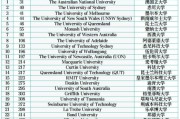东京大学的世界排名 东京大学(The University of Tokyo)被认为是亚洲最佳的大学之一,其在全球大学排名中表现优异。根据QS Wo...
2023-11-10 1759

The University College London (UCL) is one of the most prestigious universities in the world, renowned for its excellence in research and teaching. Established in 1826, it was the first university in England to admit students of any race, religion or social background. Today, UCL is a cutting-edge institution with an international reputation for its academic and research achievements across a wide range of subjects, from medicine and law to engineering and social sciences.
UCL has gone through many changes since its inception. Originally known as the London University, it was founded by a group of reformist thinkers who aimed to create a university specifically for non-Anglican students, who were excluded from Oxford and Cambridge. The University of London Act 1836 granted the institution a royal charter, which allowed it to award degrees on its own for the first time. In 1838, the college was renamed as University College London, and it continued to expand its curriculum and mission over the next century.
Throughout the 20th century, UCL continued to grow and modernize. It became the first university in the UK to admit women on equal terms as men, and in 1919, it established the first academic department of eugenics in the world. In the 1960s, UCL underwent a major restructuring that led to the creation of 19 separate faculties, which in turn led to greater specialisation and diversity in its academic programs. In the 21st century, UCL has expanded its global reach by establishing partnerships with universities around the world, including China, India, and Singapore.
UCL has had a significant impact on modern society. Many renowned scholars, scientists, and intellectuals have been affiliated with the university throughout its history, including Mahatma Gandhi, Alexander Graham Bell, and Francis Crick. UCL has also been at the forefront of many groundbreaking discoveries and inventions, such as the discovery of penicillin (which revolutionized medicine), the development of radar (which played a crucial role in World War II), and the creation of the first human-to-human blood transfusion (which saved countless lives).
Today, UCL continues to make strides in research and innovation, particularly in the areas of artificial intelligence, computer science, and neuroscience. It is also committed to promoting social justice and equality, as evidenced by its support for the Black Lives Matter movement and its pursuit of greater diversity in its student body and faculty. As UCL approaches its bicentenary, it remains a beacon of academic excellence and progressive thinking, continuing to shape the world through its research, teaching, and advocacy.
相关文章

东京大学的世界排名 东京大学(The University of Tokyo)被认为是亚洲最佳的大学之一,其在全球大学排名中表现优异。根据QS Wo...
2023-11-10 1759

加州大学分校排名顺序 加州大学系统是美国最著名的大学系统之一,它由十个校园组成,包括安大略加州大学、洛杉矶加州大学、圣巴巴拉加州大学、伯克利加州大学...
2023-11-10 1764

新西兰大学最新排名出炉,前三名皆为综合型大学 近日,新西兰大学最新排名出炉,前三名分别为奥克兰大学、坎特伯雷大学和维多利亚大学,均为综合型大学。这一...
2023-11-10 1745

2021年澳洲大学排名榜出炉 随着时间的推移,澳大利亚大学不断壮大和优化学科配置,为国际学生提供了更好的教育环境和丰富的学术资源。2021年,澳洲大...
2023-11-10 328

澳大利亚签证现已开始办理 澳大利亚签证是许多人梦寐以求的机会,如今,澳大利亚签证的申请已经正式开始。对于想要来澳大利亚旅游、学习或工作的人来说,这是...
2023-11-10 352

排名揭晓:全球前十大美术学院 对于许多艺术爱好者和有志于成为艺术家的人来说,选择一个好的美术学院是打开成功之门的第一步。这里我们为大家揭晓全球前十大...
2023-11-09 314

澳门大学:亚洲领先的国际化大学 澳门大学成立于1981年,是一所现代化的综合性大学,位于中国澳门特别行政区内。在其快速的20多年发展中,澳门大学已经...
2023-11-09 236

密歇根州立大学怎么样——综合评价及排名情况简介 密歇根州立大学(Michigan State University,简称MSU),是美国著名的公立大...
2023-11-09 280
发表评论